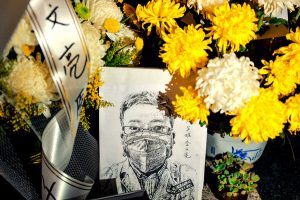Plague Journal, Skittering
Social distancing, a general quarantine for good reason; the coronavirus, extremely infectious, has no treatment. If infected, one has minor or no symptoms. Alternatively after days of fever the virus progresses for replication in the lungs, requiring a ventilator to keep one alive, until one recovers or dies. What more motivation would one need to observe a quarantine?
Without the daily routine, the social engagement of commerce, coffee shop conversation, etc. every day seems much the same. Is it Thursday or is it Friday? I am discomfited when it is difficult to remember the name of an acquaintance. We are social mammals. The mind’s well being demands face to face conversation.
I joined a online discussion last night, seated for over an hour, peering at a line of postage stamp images of eight other adults across the top of the screen. The experience seemed desiccated, abstracted of personal elan, as if thoughts can be distilled from the penumbra of the personality, of the body — then offered from the phosphor of a LCD screen. I know that multitudes are accustomed to the technology for education, for business. I’d give a failing grade to the technology.
I am dismayed at the serial failure of the Federal government to organize, and lend direction to the necessary testing which must be effective and widely available, if the virus is to be beaten. Read this in the New York Times this morning; reporter Rukmini Callimachi writes about the testing backlog in New Jersey.
Seeing Americans lining up the night before to get a very important test for their health done. When I showed up, there was a mile-long line of cars. The engines had been cut off. The windows were fogged up. Drivers were basically asleep in their cars. I showed up at 6:30 in the morning when the center was going to open at 8. And, you know, I’ve covered wars all over. And these are conditions that I’m used to seeing in the developing world, not in America.
The bold emphasis is mine.
And this from our neighbors in China:

Dr. Li Wenliang tried to warn China about the coronavirus but was silenced by the government authorities. He became a hero in the country when his warnings proved true, then a martyr when he died from the virus in February.
Today, people gather, virtually, at his last post on Weibo, the Chinese social media platform, to grieve and seek solace in the comments section.
Our columnist Li Yuan writes: “In a largely atheist yet spiritual nation with little tradition of praying, the digital Wailing Wall allows the Chinese people to share their sadness, frustration and aspirations with someone they trusted and loved.” — New York Times
By way of comment: nothing can be built upon lies, truth telling is non-negotiable.
Some books that I am reading: Sacrifice by René Girard, explores religious violence through the lens of mimetic theory.
The Plague by Albert Camus. Finished the book and now plan to revisit the marked passages which express philosophical points of view.
Euthydemus by Plato. Recommended by a friend as a humorous rendition of Socrates. First time reading this dialog. Plato, funny? Who knew?